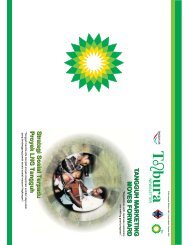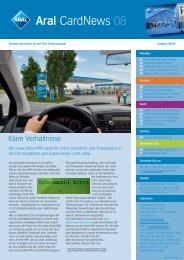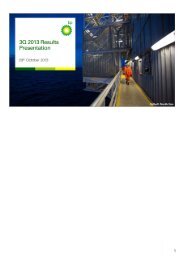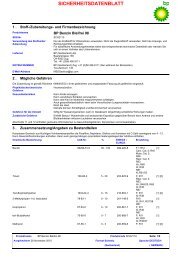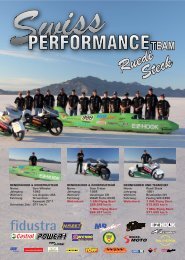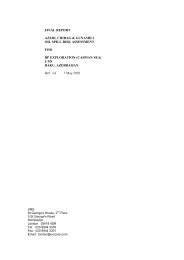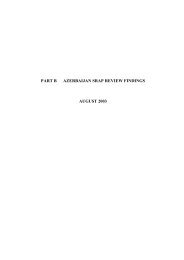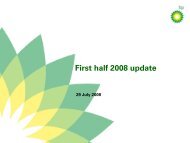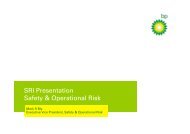Create successful ePaper yourself
Turn your PDF publications into a flip-book with our unique Google optimized e-Paper software.
order to prepare for <strong>the</strong> anticipated<br />
increase in air traffic. Tourism is a big part<br />
<strong>of</strong> <strong>the</strong> growth, but business travel is on <strong>the</strong><br />
rise as well. Visiting <strong>the</strong> Brazilian<br />
Consulate in Houston, I discover that<br />
applications for business visas to Brazil<br />
have grown at a remarkable rate over <strong>the</strong><br />
past 18 months. Whe<strong>the</strong>r tourism or<br />
business is attracting people to Brazil, <strong>the</strong><br />
hidden potential is building momentum.<br />
Paulo Pinho, head <strong>of</strong> <strong>BP</strong>’s bi<strong>of</strong>uels venture<br />
in <strong>the</strong> country, sees <strong>the</strong> opportunity in<br />
Brazil as far-reaching.<br />
“Given today’s petroleum price<br />
volatility and <strong>the</strong> global interest in<br />
reducing dependency on hydrocarbon fuel,<br />
our joint venture, Tropical Bioenergia,<br />
gives <strong>BP</strong> a position in <strong>the</strong> growing sugar<br />
cane ethanol industry in Brazil,” says Pinho.<br />
And Brazil is <strong>the</strong> place for this business,<br />
producing around 22 billion litres <strong>of</strong> sugar<br />
cane ethanol per year, according to its<br />
industry organisation UNICA, and<br />
continues to show big growth. With two<br />
harvests per year, sugar cane is plentiful in<br />
Brazil, and studies show that <strong>the</strong>re is<br />
enough arable land available to support<br />
production <strong>of</strong> bi<strong>of</strong>uels without having an<br />
impact on land for food crops, or sensitive<br />
areas such as rainforests. Brazil is far ahead<br />
<strong>of</strong> most countries in providing fossil and<br />
bi<strong>of</strong>uels to consumers; 90% <strong>of</strong> <strong>the</strong> vehicles<br />
are flex-fuel, so <strong>the</strong> driver can switch fuels<br />
whenever <strong>the</strong> prices change. “Increasing<br />
capacity for making sugar cane ethanol, as<br />
we plan to do at Tropical, creates more<br />
opportunity for exporting to consumers<br />
who want <strong>the</strong> choice.”<br />
Discovering Brazil is a trip more and<br />
more people and businesses are taking, and<br />
<strong>the</strong> prize is a gold mine <strong>of</strong> fortune and<br />
prosperity from every direction. The<br />
undiscovered country is about to burst<br />
onto <strong>the</strong> world’s radar. ■<br />
“Given today’s petroleum<br />
price volatility and <strong>the</strong><br />
global interest in<br />
reducing dependency on<br />
hydrocarbon fuel, our<br />
joint venture, Tropical<br />
Bioenergia, gives <strong>BP</strong> a<br />
position in <strong>the</strong> growing<br />
sugar cane ethanol<br />
industry in Brazil.”<br />
Paulo Pinho<br />
Field to fuel: farming sugar cane is<br />
paying <strong>of</strong>f in a big way as <strong>the</strong> world<br />
takes a close look at Brazil’s sugar<br />
cane ethanol industry.<br />
<strong>BP</strong> MAGAZINE Issue 1 2009 47


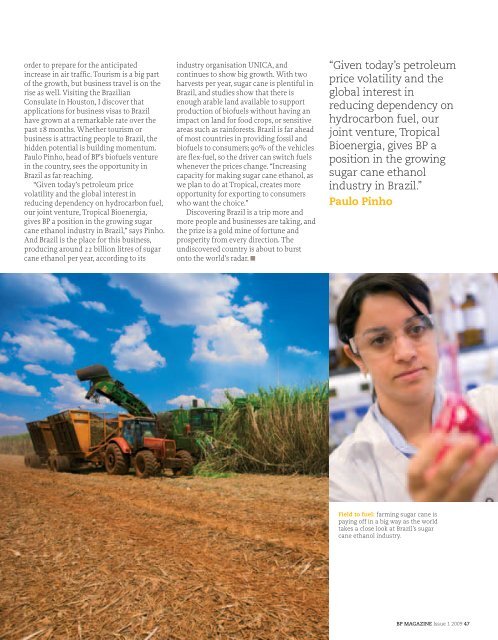
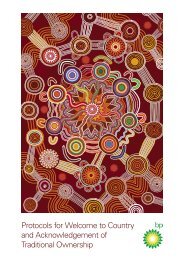
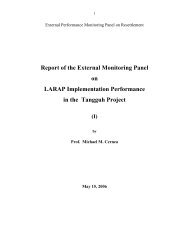
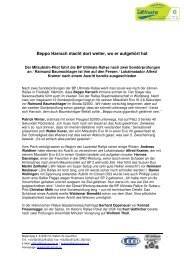
![[PDF] Deepwater Horizon: Accident Investigation Report - BP](https://img.yumpu.com/51697031/1/190x245/pdf-deepwater-horizon-accident-investigation-report-bp.jpg?quality=85)
